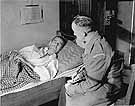
|
|
|

|

|

|

|
|
Click on an image to see a larger, more detailed picture.
|
|
|
|
|
| 1945: Liberation and Rebuilding |

|
pg. 627 |

|
|
|
|
| |
 In July 1945 the Swedish government agreed to provide medical care for 10,000 infirm concentration-camp survivors. The former prisoners were first sent to the Swedish Transit Hospital at Lübeck, Germany, and then were transported to Sweden. This patient, among others, was too ill to travel and had to remain at the hospital. A United Nations Relief and Rehabilitation Association official is interviewing him about his possible return to Poland.
In July 1945 the Swedish government agreed to provide medical care for 10,000 infirm concentration-camp survivors. The former prisoners were first sent to the Swedish Transit Hospital at Lübeck, Germany, and then were transported to Sweden. This patient, among others, was too ill to travel and had to remain at the hospital. A United Nations Relief and Rehabilitation Association official is interviewing him about his possible return to Poland.
Photo: Imperial War Museum
|
 An American GI stands at the "Temple of Honor," a memorial of "Nazi martyrs" in Munich, Germany. The stately monument memorialized deceased National Socialists, whereas their victims' corpses, mostly those of Jews, were dumped in nameless mass graves or burned in ovens. The only memorial to the Nazis' victims was the fleeting smoke that rose to the sky.
An American GI stands at the "Temple of Honor," a memorial of "Nazi martyrs" in Munich, Germany. The stately monument memorialized deceased National Socialists, whereas their victims' corpses, mostly those of Jews, were dumped in nameless mass graves or burned in ovens. The only memorial to the Nazis' victims was the fleeting smoke that rose to the sky.
Photo: Philip Drell
|
 Elie Wiesel
Elie Wiesel
As a Jewish teenager in 1944, Elie Wiesel was deported with his family from Transylvania to Auschwitz-Birkenau. Though his mother and sister were gassed, Elie was liberated from the Buchenwald concentration camp in 1945. Questioning the silence of both the Allies and of the Jewish God before the apocalypse that was the Holocaust, Wiesel wrote a memoir of his Holocaust experiences, And the World Stood Silent, which was later retitled Night. Winner of the 1986 Nobel Peace Prize, Wiesel has movingly portrayed Jewish life and spirit in countless essays and more than 20 books. He has pointed out that "while not all victims [of the Holocaust] were Jews, all Jews were victims." Jolting the conscience of the world, he publicly questioned U.S. President Ronald Reagan's decision to visit the Bitburg, Germany, cemetery, where SS members were buried: "Mr. President," he declared, "your place is with the victims, not the SS." Wiesel continues to write and speak about the moral indecency of silence and the necessity of human dignity.
Photo: Bernard Gotfryd / Archive Photos
|
|

|

|

|

|
 June 1945: Displaced Jews at the Buchenwald, Germany, displaced-persons camp establish Kibbutz Buchenwald, an agricultural training center designed to help young Jews succeed at kibbutz (communal) life.
June 1945: Displaced Jews at the Buchenwald, Germany, displaced-persons camp establish Kibbutz Buchenwald, an agricultural training center designed to help young Jews succeed at kibbutz (communal) life.
|
 June 1945: Public-opinion polls indicate that Americans consider Jews a far greater threat to America than they consider German or Japanese Americans.
June 1945: Public-opinion polls indicate that Americans consider Jews a far greater threat to America than they consider German or Japanese Americans.
|
 Mid-1945: Kibbutz Nili is established on the former estate of Julius Streicher, near Pleikershof, Germany, to train Jewish displaced persons in agriculture and provide schooling for Jewish boys and girls.
Mid-1945: Kibbutz Nili is established on the former estate of Julius Streicher, near Pleikershof, Germany, to train Jewish displaced persons in agriculture and provide schooling for Jewish boys and girls.
|
 June 14, 1945: Nazi Foreign Minister Joachim von Ribbentrop is arrested by the British.
June 14, 1945: Nazi Foreign Minister Joachim von Ribbentrop is arrested by the British.
|
 June 30-July 14, 1945: "Lest We Forget," an exhibition of death-camp photography organized by the St. Louis Post-Dispatch and the Washington Evening Star, tours Boston, Massachusetts, and the Midwest. It is viewed by nearly 90,000 Americans.
June 30-July 14, 1945: "Lest We Forget," an exhibition of death-camp photography organized by the St. Louis Post-Dispatch and the Washington Evening Star, tours Boston, Massachusetts, and the Midwest. It is viewed by nearly 90,000 Americans.
|
 July 25, 1945: "Euthanasia" advocate Kurt Gerstein, the former head of the Waffen-SS Institute of Hygiene in Berlin, hangs himself in prison.
July 25, 1945: "Euthanasia" advocate Kurt Gerstein, the former head of the Waffen-SS Institute of Hygiene in Berlin, hangs himself in prison.
|
|
|
|
|
| 1945: Liberation and Rebuilding |

|
pg. 627 |

|
|
The Holocaust Chronicle
© 2009 Publications International, Ltd.
|
|
